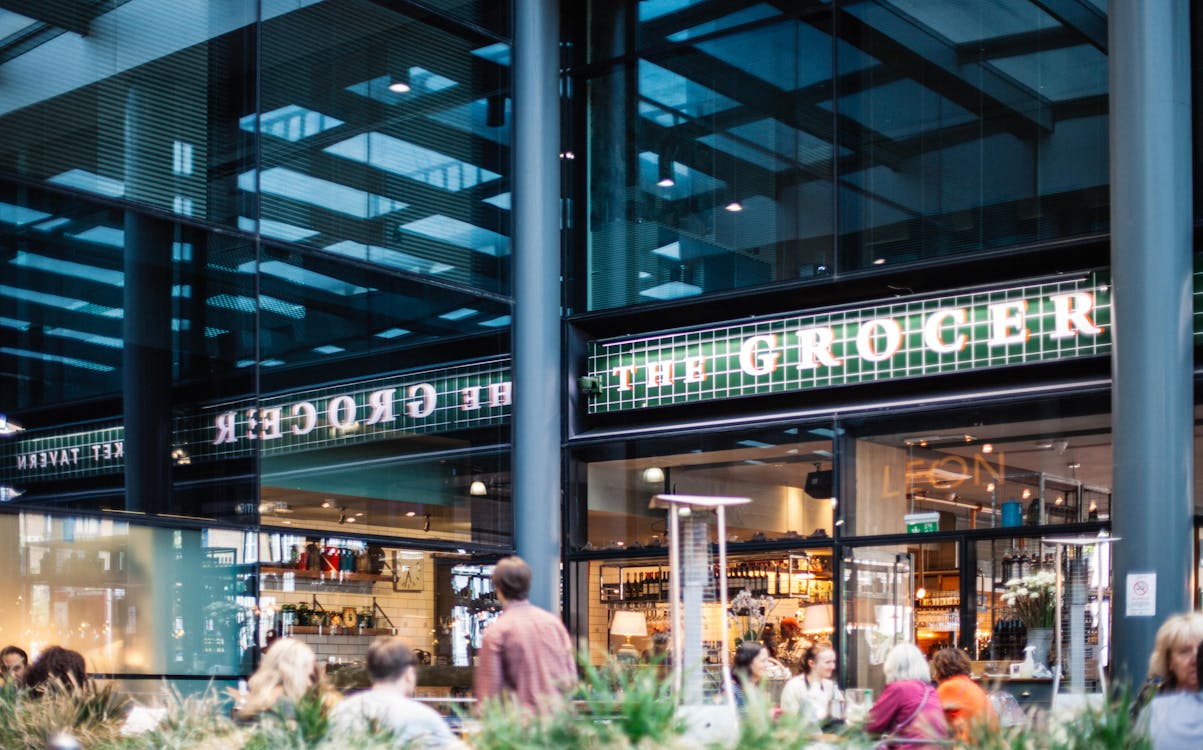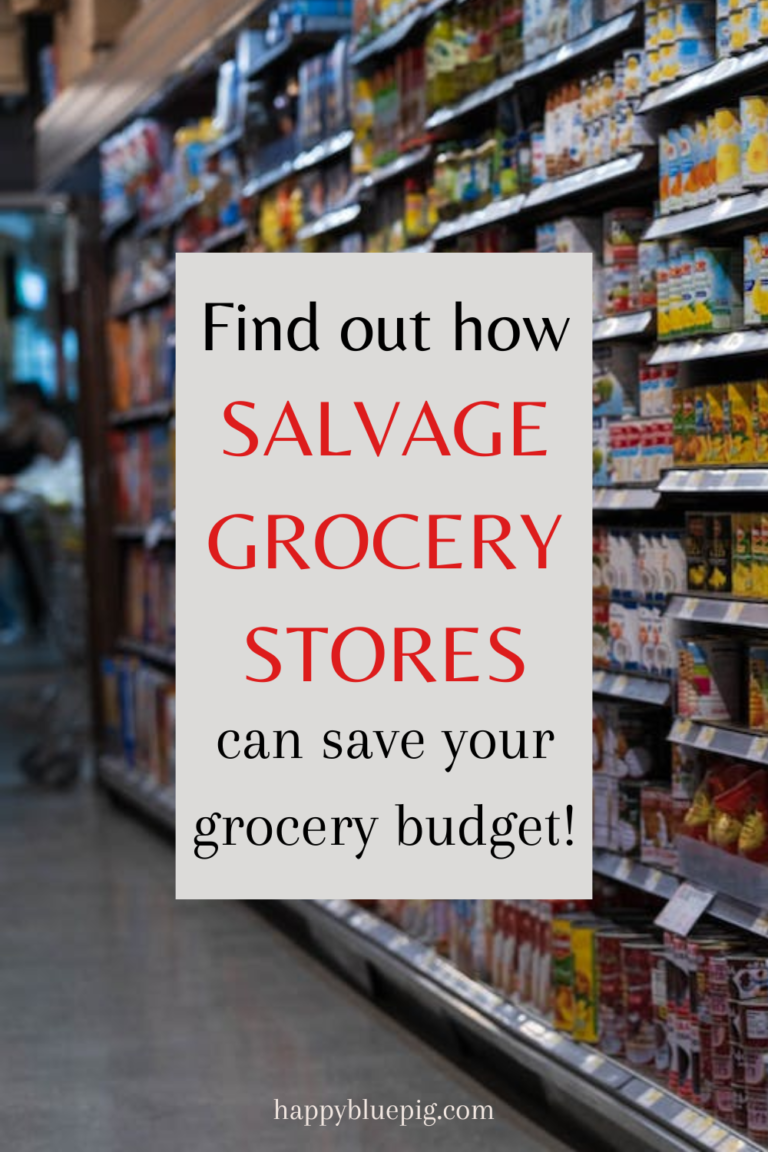As I update my budget for next year, it seems like every category is higher than before. Inflation has hit my grocery budget hard. I like shopping sales, using paper or digital coupons, and apps like ibotta. But the biggest way I can spend less on groceries is by shopping at salvage grocery stores. I’m fortunate to live near a salvage grocery store, but I regularly see people from neighboring states there. They come and fill 2 carts to stock up on nonperishable items at low prices! Yes, you CAN save that much money at these stores. I actually have seen a big increase in the number of shoppers at my local salvage grocery store in the past year or two, as grocery prices have soared nationwide. If you’ve never been inside a salvage grocery store, now is the time to learn if it can help you too.
This post may contain affiliate links, which means I’ll receive a commission if you purchase through my links, at no extra cost to you. Please read full disclosure for more information.

What is a salvage grocery store?
Salvage grocery stores are sometimes also called bents-and-dents stores. These stores sell foods that other retailers will not sell. For example, cans may be dented, labels may be torn or misprinted, or items may be past their sell-by date. Sometimes, a delivery is rejected by a big grocery store due to damage in portion of the load. However, much of the food contained in that delivery has nothing wrong with it. That food may end up in a salvage grocery store. Salvage grocery stores may also sell products that big grocery stores don’t want because it’s been discontinued or the product’s packaging has changed.
My local salvage grocery store also does keep some items in stock regularly. They work with local food producers to get good deals. It’s a nice way to support local farmers and local businesses. You will never know what you may find in your local salvage grocery store until you go shop. And what the salvage grocery store has on its shelves will change from week to week or even day to day. By now, I know my store pretty well, and I make sure I’m there when they bring the day-old cinnamon bread from Pepperidge farm!
Benefits of salvage grocery stores
Spend less
Of course, the biggest benefit to us, the consumers, is the low prices. I would guess that I spend an average of about 50% less on the groceries that I can get at the salvage grocery store. Also, I can buy products that I wouldn’t normally buy in the regular store. If I can find a good deal at the salvage store, I like to buy frozen foods, name brand snacks and candies, cashews, granola and trail mixes, and gourmet coffee that I can’t afford normally. Of course, you can’t get everything at the salvage grocery store. I can base our meals around what I find at the salvage grocery store. Then I only need to pay full price for a few specific items each month that we can’t do without.
Less food waste

How much can I save at a salvage grocery store?
Food prices vary across the US, and each salvage grocery store is unique. You can often spend about 50% less on groceries at these stores.
Here’s some examples from my latest shopping trip:
Overall, I spent 51% less by shopping at the salvage grocery store. I saved $71.63!
As you can see, some deals are really great! Some prices are about the same as buying generic at the regular grocery store. I needed the baby wipes, so I bought them while I was there because the price was close. With a coupon, I might have been able to get a better deal at the regular store, but I didn’t want to make a special trip to the regular store just for wipes. If I had, I would use extra gas on the trip and may possibly be tempted to buy other items that weren’t on the shopping list.

Is the food at salvage grocery stores safe and good quality?
Yes! In the US, the government inspects the food at grocery stores and that includes salvage grocery stores. State and local health departments do food-store inspections, and you can ask for this report if you want. You might even be able to find the reports online.
Of course, take your time and use your judgement when shopping at a salvage grocery store.
A small dent in a can is likely fine. I usually avoid large dents or cans with rust.
If a box is dented or ripped but the plastic packaging inside is intact, then the food is fine. If the plastic packaging is ripped or a seal is broken, I’d avoid it.
You may be able to get rock bottom prices on items that are past their best-by date. If it is a cake mix or something like that, then it will be just fine! Other items will have decreased taste past their best-by date. Definitely do not buy baby foods or infant formulas after the expiration date.
You can find other tips for shopping and choosing safely on the FDA website.
Expiration date, sell-by date, best-by date: What do they really mean for food safety?
Date Labeling
Since product dating isn’t required, there isn’t any universally accepted method for dating either. None of these date labels below have any bearing on product safety! They only refer to optimal product quality (taste, texture, etc) as determined by the manufacturer. Here’s what you may see:
Sell-by date
How long a store should keep the product on their shelves for sale, for best quality
Best-by date
Food will have the best flavor or quality before this date
Use-by date
Food will have the best flavor or quality before this date. This date has no bearing on product safety.
Freeze-by date
The date by which an item should be frozen for best quality. Again, this date has no bearing on product safety.
When you’re shopping:
What that means for us is that, it is perfectly fine to buy a food that is past its date. Certainly, use your judgement when buying, and don’t buy something you aren’t comfortable with serving to your family. The best way to determine if a food is safe is to make sure packaging is intact, and to look for signs of food spoiling.
How I shop salvage grocery stores:
I generally try to buy foods that haven’t passed their date. However, I like knowing that if I stock up and don’t use my whole supply right away, it will be fine. And for some products, I’ll buy out-of-date for a good deal if we’ll use it soon. There are some products that I feel do not taste as good if they are past their date. Other products, I can’t tell the difference in taste.
Some products that tend to taste just fine past their date are: canned goods, baking mixes, hot chocolate, dry pasta, cereal, cheese, yogurt, frozen veggies, bread, and crackers. I’ll still buy cheese or bread that is just past its expiration date, even if I can’t use it all right away. I’ll just take it home, package it in small portions I can use quickly, and freeze it. You can do the same thing with meat. Just make sure it has been handled properly and doesn’t show signs of spoiling. Meat that is close to its best-by date can be frozen or canned to keep it safely until it can be used.

Where can I find a salvage grocery store?
When searching the internet or asking around in your local area, look for Bent and Dent stores or Banana Box stores. Areas with Mennonite and Amish are very likely to have salvage grocery stores. You can also check out this map with salvage grocery stores across the US. Before you shop, find out if the store takes credit cards, checks, or only cash. Many take credit cards, but some, particularly those run by Amish, may not have a telephone and may not accept credit cards.
For other tips on reducing your grocery costs, check out my post on how to save money on meat for your family.
Do you shop at a salvage grocery store? Share your tips for buying cheap or share how much you saved. Let’s celebrate those financial wins together! Comment below or email me at [email protected]. I would love to hear from you!


